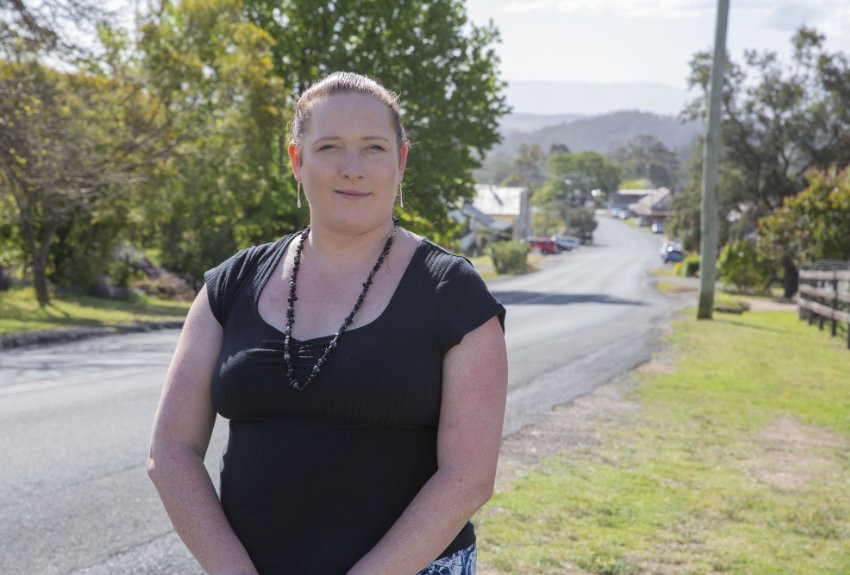The SANE Blog
Managing anxiety when your fear comes to life
Bushfire trauma can have a profound impact on existing mental health issues. Finding the right support is key to getting through disaster recovery and bushfire anniversaries.
The town of Wolumla, on the New South Wales south coast is a small village just south of Bega, surrounded by picturesque farmland. But over the summer of 2019/20, the landscape changed. On New Year’s Day, a ring of flames surrounded the region, with fires burning to the north and south. The sky turned orange, blotting out the sun. The ground was blanketed in ash. Fear gripped the town.
Anxiety often feels irrational – symptoms can pop up for no obvious reason, or when we least expect it. People living with anxiety disorders and Obsessive Compulsive Disorder (OCD) can experience intrusive thoughts about devastating, life-threatening events even if they’re extremely unlikely. Therapies and self-help techniques teach us to recognise those feelings and move on when we’re ready, knowing things are safe.
But what if they’re not? What happens when our fears come true?
Hayley was caring for her mum in nearby Merimbula at the time of the fires. Fear was a feeling she knew well – she had lived with anxiety and OCD for almost ten years. But as the flames closed in, she couldn’t stop the racing thoughts. It was, she says, like being in a “warzone”, and her symptoms returned with force.
“I manage anxiety every day,” she explains. “So, for me, it was quite profound to be not able to control my anxiety. All of the strategies that I once had around it were gone, because no one could control the fires.” Although Hayley had learned techniques to manage day-to-day, nothing could have prepared her for a disaster of this nature.
Your usual coping mechanisms might not help
There are lots of ways to manage anxiety and OCD symptoms: for example, slow breathing, recognising warning signs, breaking down the problems and seeking support from others who understand. Over time, you might have developed your own ways to cope, building on what you know and realising the feelings will pass.
When Hayley found herself in the path of the fires, she began to obsess over the growing danger. Her thoughts spiralled away from her. The techniques she had learned didn’t work anymore. Because she couldn’t control the situation, she was hypervigilant, constantly checking to see where the fire was. “I was exhausted,” she says. “I couldn’t sleep, couldn’t eat, couldn’t rest. It had such a profound impact on my mental health.”
Reaching out to community can be grounding
Feeling out of control is an understandable response to bushfire trauma. It’s unlike other anxiety triggers, and it doesn’t necessarily end once the fires have been put out. The right strategies are critical for getting through.
Hayley turned to her community for support. Her best girlfriends, Jessie and Elice, normalised life in a really hard and uncertain time. They got together regularly to talk about their fears, listen and reassure.
“We were there for each other,” Hayley says. “Nothing was too big or too small for us.”
Staying connected is always important for our mental health, but even more so in a time of disaster. Local communities offer all sorts of ways to be in touch, from faith-based organisations and sporting clubs to special interest groups and activity clubs. Finding like-minded people gives us a safe place to share our thoughts and realise that we’re not alone.
It’s helpful to prepare for significant dates
Along the east coast of Australia, temperature records continue to be broken. As the country heads into each scorching summer, it’s understandable to be reminded of previous terrifying fire seasons. You may find that your existing mental health issues are exacerbated by familiar weather conditions or specific dates and anniversaries.
Being aware of them is a great starting point, but there’s plenty more you can do:
- Make note of what you did to cope during the disaster
- Write down which techniques worked best in the past
- Keep handy contact details for your mental health professionals, family, friends and emergency services
- Connect with others on SANE’s Life After Bushfires forum
- Create a wellbeing plan, including the steps you’ll take if you start to feel at risk
- Follow SANE’s guide to self-care during disaster recovery
Remember, what works for someone else might not be the right tool for you. Everyone works through bushfire trauma differently, and it’s okay to keep figuring out what’s right for you.
For Hayley, it’s about knowing what to expect and drawing on her experiences. She’s worried about it happening again, so she’s keeping a close eye on anxiety and trauma symptoms that might reappear.
“In moving forward after an experience like that, some of the things I learned were that: I’m human, and the genuine relationships that I’ve developed are more meaningful with my friends, the power of resilience and getting through,” she says. “It’s given me a lot more strategies and I just come back better. I just get better at managing it.
“If you can get through something like that, you can get through more.”
SANE provides a range of free telephone and online support services for people over 18 years of age with complex mental health needs and their family, friends and carers. We offer different types and levels of support so you can find what works for you. Choose from counselling, peer support, online groups and events, 24/7 community forums, and online information and resources. Learn more at sane.org/get-support.
When you subscribe to the blog, we will send you an e-mail when there are new updates on the site so you wouldn't miss them.
